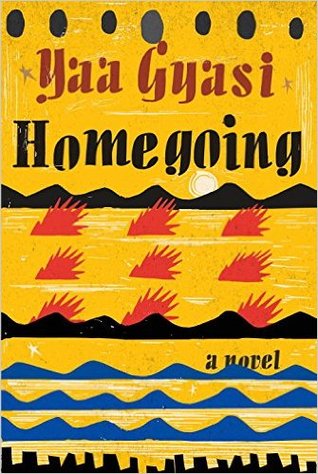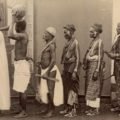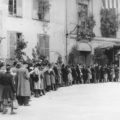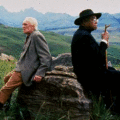 In the other room, Beulah started whimpering in her sleep. The child had night terrors. They came at unpredictable intervals: one month here, two days there. Some days they were so bad she would wake herself up to the sound of her own screams or she’d have scratches along her arms from where she’d fought invisible battles. Other days she slept still as death, tears streaming down her face, and the next day, when asked what she’d dreamed about, she always shrugged and said,
In the other room, Beulah started whimpering in her sleep. The child had night terrors. They came at unpredictable intervals: one month here, two days there. Some days they were so bad she would wake herself up to the sound of her own screams or she’d have scratches along her arms from where she’d fought invisible battles. Other days she slept still as death, tears streaming down her face, and the next day, when asked what she’d dreamed about, she always shrugged and said,
“Nothing.”
This day, Jo looked out and saw the girl’s little legs start to move: a bend at the knee, an outward kick, repeat. Beulah was running. Maybe this was where it started, Jo thought. Maybe Beulah was seeing something more clearly on the nights she had these dreams, a little black child fi ghting in her sleep against an opponent she couldn’t name come morning because in the light that opponent just looked like the world around her. Intangible evil. Unspeakable unfairness. Beulah ran in her sleep, ran like she’d stolen something, when really she had done nothing other than expect the peace, the clarity, that came with dreaming. Yes, Jo thought, this was where it started, but when, where, did it end?
Jo decided to keep his family in Baltimore. Anna was too pregnant to haul up from the city to which they were all rooted, and Baltimore still felt safe. People kept whispering about the law. A few families even made moves, packing up and heading north for fear that the law would
pass. Ol’ Bess who sold the flowers on North Street went. So did Everett, John, and Dothan, who worked on Alice.
“Damn shame,” Poot said the day three Irishmen walked onto the boat to replace them.
“You ever think ’bout leavin’, Poot?” Jo asked.
Poot snorted. “They gon’ bury me in Baltimore, Jo. One way or another. They gon’ throw my body down into the Chesapeake Bay.”
Jo knew he meant it. Poot always said that Baltimore was a great city to be a black man in. There were black porters and teachers, preachers and hucksters. A free man didn’t have to be a servant or a coach driver. He could make something with his own hands. He could fix something, sell something. He could build something up from the ground, then send it out to sea. Poot had taken up caulking when he was only a teenager, and he often joked that the only thing he liked better than holding a mallet was holding a woman. He was married but he had no children, no son to teach his trade to. The ships were his pride. He would never leave Baltimore.
And for the most part, everyone else in Baltimore stayed put too. They were tired of running and used to waiting. And so they waited to see what would come.
Anna’s belly continued to swell. Baby H was making itself known every day with ferocious kicks and punches to the inside of Anna’s gut. “H is gon’ be a boxer,” ten- year- old Cato said, resting his ear against his mother’s stomach.
“Nuh-uh,” Anna said. “There won’t be no violence in this house.” Five minutes later, Daly kicked Eurias in the shins, and Anna spanked him so hard he winced every time he sat down that day.
Agnes turned sixteen and took a job cleaning the Methodist church on Caroline Street, and Beulah relished her new role as oldest child in the house for the one hour of every evening before Agnes returned home from work.
“Timmy say he and Pastor John ain’t going nowhere,” Agnes reported one night. It was August 1850 and Baltimore had taken on a sticky heat. Agnes would come home every night with sweat licking at her upper lip, her neck, her forehead. Timmy was the pastor’s son, and every day Jo and the rest of the family were subjected to Agnes’s reports on what Timmy had thought, done, or said that day.
“So I guess that means you ain’t going nowhere neither?” Anna said with a smirk, and Agnes huffed out of the house. She said it was in search of some chocolate for the kids, but they all knew that Anna had struck a nerve.
Ma Aku laughed as the door slammed. “That child don’t know nothin’ ’bout love,” she said. Her laugh turned into a cough, and she had to bend forward to let the cough fall out.
Jo kissed Anna’s forehead and looked at Ma. “What d’you know ’bout love, Ma?” he asked, taking over the laugh where she left it.
Ma wagged her finger at him. “Don’t go askin’ me what I know an’ don’t know,” she said. “You ain’t the only one who ever touched or been touched by somebody.”
It was Anna’s turn to laugh, and Jo dropped the hand that he had been squeezing, feeling a bit betrayed. “Who, Ma?”
Ma shook her head, slowly. “Don’t matter.”
Two weeks later, Timmy came by the docks to ask Jo for Agnes’s hand in marriage.
“You know a trade, boy?” Jo asked.
“I’m gonna be a preacher like my daddy,” Timmy said.
Jo grunted. He’d been to a church only once since the day he and Ma Aku were kicked out for witchcraft, and that was the day of his own wedding. If Agnes married this preacher’s son, he’d have to go again for her wedding and then who knew how many more times.
The day they’d walked the five miles home from the Baptist church, after Jo had given Mirabel’s father the frog, Jo had cried and cried. Ma Aku had let him carry on for a few minutes, and then she snatched his ear up with her hand, dragged him into an alley, looked at him hard, and said, “Whatchu cryin’ fo’, boy?”
“Pastor say we was doin’ African witchcraft.” He wasn’t old enough to know what that meant, but he was old enough to know shame, and that day, he was full up to his ears with it.
Ma Aku spit behind her left shoulder, something she only did when truly disgusted. “Who tol’ you to cry fo’ that?” she asked, and he shrugged his shoulders, tried to keep his nose from running, for it seemed to make her more angry. “I tell you, if they had not chosen the white man’s god instead of the gods of the Asante, they could not say these things to me.”
Jo knew he was supposed to nod, and so he did. She continued. “The white man’s god is just like the white man. He thinks he is the only god, just like the white man thinks he is the only man. But the only reason he is god instead of Nyame or Chukwu or whoever is because we let him be. We do not fi ght him. We do not even question him. The white man told us he was the way, and we said yes, but when has the white man ever told us something was good for us and that thing was really good? They say you are an African witch, and so what? So what? Who told them what a witch was?”







